The Climate Resilience Center in Piedmont Triad of North Carolina (NC)
The Climate Resilience Center (CRC) in the Piedmont Triad, NC will investigate the links between the effects of changing climate on air quality and urban heat, and the subsequent undue burden on marginalized communities in major cities across NC – Greensboro, Winston Salem, and Charlotte. The Center has three focus areas: Research, Community engagement and Education.
Research: Center utilizes modelling and laboratory studies to accurately predict urban atmospheric composition in a changing climate, and to understand the environmental drivers and climatic impact of biogenic and anthropogenic volatile organic compounds (VOCs).
Community Engagement: The Center has a community engagement component for assessing the impacts on the vulnerable communities and involves engaging local communities in defining metrics for impacts and resilience and integrating scientific and community understanding. This Center aims to address environmental equity concerns focused on climate resiliency and the compounding effects of climate changes such as urban air quality and urban heat in the piedmont area of North Carolina.
Education: The education and training aspects of the project focus on the next generation of atmospheric scientists and will develop culturally and socially relevant activities that promote students’ engagement, agency, and social responsibility.
This is the first set of Air Quality Sensors we will be installing in East Greensboro. This sensor is on campus and provides realtime reading of PM concertation on campus.
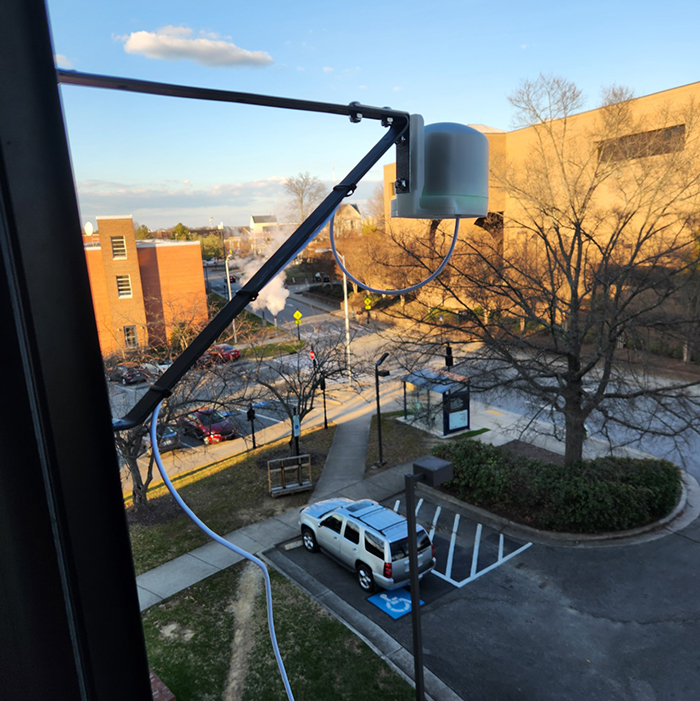
Our team's Dr. Stone and Dr. Dorestant conducted the first of a series of focus group study meetings in collaboration with the Greensboro Sustainability Council on Environmental Justice.
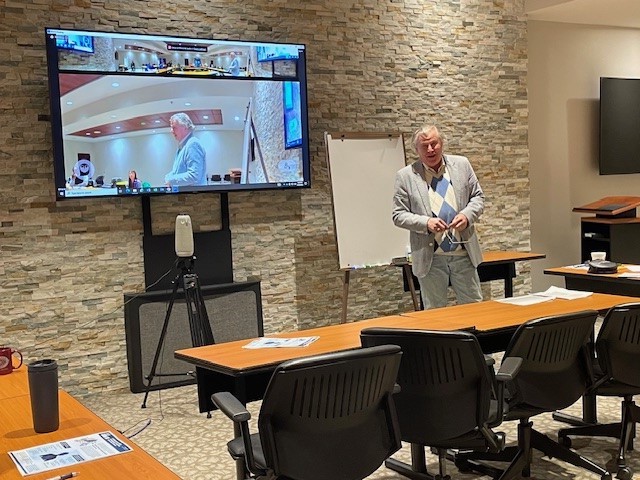
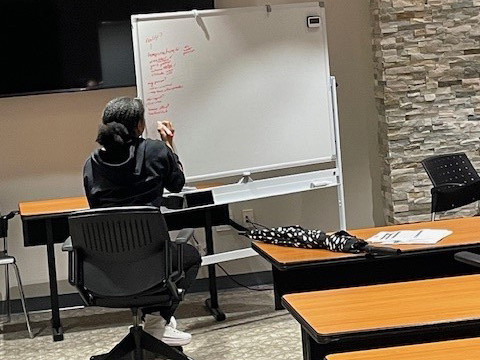
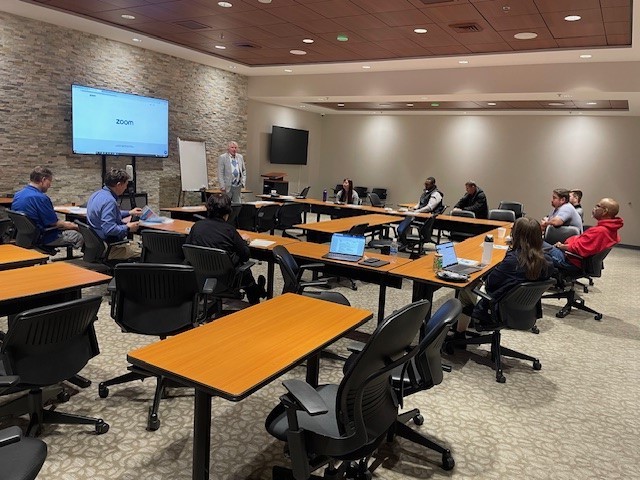
Members/Research Teams
Principal Investigator/Director Professor of Physics and Applied Sciences and Technology
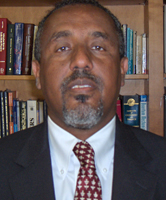 Dr. Solomon Bililign joined NCA&T in 1993. He did his undergraduate and MS work in Physics at Addis Ababa University, Ethiopia, PhD at the University of Iowa and postdoctoral research fellowship at the University of Utah Department of Chemistry. His area of specialization includes Experimental and Theoretical Atomic, Molecular and Optical Physics /and Chemical Physics. He built research capacity in chemical physics and atmospheric sciences at NCA&T with a combined federal grant of over 23 million. In 2010 he was the recipient of the Presidential Award for Excellence in Science, mathematics, and Engineering. He has received the senior researcher award for NCAT in 2002 and 2017, teaching excellence award in 2006, 2015 and 2018. He coordinates Center activities and participates in both experimental work and community activities related to the project.
Dr. Solomon Bililign joined NCA&T in 1993. He did his undergraduate and MS work in Physics at Addis Ababa University, Ethiopia, PhD at the University of Iowa and postdoctoral research fellowship at the University of Utah Department of Chemistry. His area of specialization includes Experimental and Theoretical Atomic, Molecular and Optical Physics /and Chemical Physics. He built research capacity in chemical physics and atmospheric sciences at NCA&T with a combined federal grant of over 23 million. In 2010 he was the recipient of the Presidential Award for Excellence in Science, mathematics, and Engineering. He has received the senior researcher award for NCAT in 2002 and 2017, teaching excellence award in 2006, 2015 and 2018. He coordinates Center activities and participates in both experimental work and community activities related to the project.
Relevant Publications
- Marc N. Fiddler, Chelia Thompson, Rudra P. Pokhrel, Francesca Majluf, Manjula Canagaratna, Edward C. Fortner, Conner Daube, Joseph R. Roscioli, Tara I. Yacovitch, Scott C. Herndon, Solomon Bililign.(2024) Emission factors from wildfires in the Western US – An investigation of fuel type and diurnal dependencies during the FIREX-AQ 2019 campaign. Journal of Geophysical Research-Atmosphere, Volume 126, Issue 1 Reimagine fire science for the anthropocene | PNAS Nexus | Oxford Academic (oup.com)
- Jacquelyn K Shuman, ……… Solomon Bililign, et al. (2022) “Reimagine fire science for the Anthropocene”, PNAS Nexus, pg115, https://doi.org/10.1093/pnasnexus/pgac115
- Jaime Ross Green. Marc Nicholas Fiddler, Dorothy L. Fibiger, Erin E. McDuffie, Pedro Campuzano-Jost, Jason Clay Schroder, Jose L. Jimenez, Andrew John Weinheimer, Glenn M. Wolfe, Solomon Bililign, Steven S. Brown (2021) “Wintertime Constraint of Primary and Secondary Formaldehyde Emission Sources over the Eastern Coastal United States.” Journal of Geophysical Research-Atmosphere, 2021, 126(5), e2020JD033518, https://doi.org/10.1029/2020JD033518
- Kunkel, K. E, D.R. Easterling, A. Ballinger, Solomon Bililign, S.M. Champion, D.R. Corbett, K. D. Dello, J. Dissen, G. M. Lackmann, R. A. Luettich, Jr., L.B. Perry, W.A. Robinson, L.E. Stevens, B. C. Stewart, and A. J. Terando, {2020): “North Carolina Climate Science Report.” North Carolina Institute of Climate Studies, 233PP. https://ncics.org/nccsr
- Viral Shah, Lyatt Jaeglé, Joel A. Thornton, Felipe D. Lopez-Hilifiker, Ben H. Lee, Jason C. Schroder, Pedro Campuzano-Jost, Jose L. Jimenez, Hongyu Guo, Amy P. Sullivan, Rodney J. Weber, Jaime R. Green, Marc N. Fiddler, Solomon Bililign, Teresa L. Campos, Mechan Stell, Andrew J. Weinheimer, Denise D. Montzka, Steven S. Brown (2018). “Chemical feedbacks suppress the wintertime response of atmospheric particulate sulfate and nitrate to emissions reductions over the Eastern” U.S. Proceeding of the National Academy of Sciences, 2018, 115(32), 8110-8115. https://www.pnas.org/content/115/32/8110
Professor of Physics and Applied Sciences and Technology
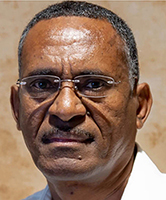 Dr. Ademe Mekonnen holds a PhD and MSc in atmospheric Science and BSc in Physics. His research interest and role in CRC: His area of interest is Tropical climate variability and change. This includes precipitation processes, precipitation variability and predictability, particularly over Africa. We have interest in tropical wide research and currently focusses on African climate. He is also interested in the study of Atlantic tropical cyclones. He studies the multiscale interaction between different types of convection and atmospheric disturbances. His role in CRC includes student training (modeling and statistical analysis of observed and remotely sensed data) and coordinating project activities such as citizen science activities.
Dr. Ademe Mekonnen holds a PhD and MSc in atmospheric Science and BSc in Physics. His research interest and role in CRC: His area of interest is Tropical climate variability and change. This includes precipitation processes, precipitation variability and predictability, particularly over Africa. We have interest in tropical wide research and currently focusses on African climate. He is also interested in the study of Atlantic tropical cyclones. He studies the multiscale interaction between different types of convection and atmospheric disturbances. His role in CRC includes student training (modeling and statistical analysis of observed and remotely sensed data) and coordinating project activities such as citizen science activities.
Recent Publications
- Bissolli, P., C. Ganter, A. Mekonnen, A. Sánchez-Lugo, and Z. Zhu, Eds., 2023: Regional Climates [in “State of the Climate in 2022“]. Bull. Amer. Meteor. Soc., 104 (9), S366–S473, https://doi.org/10.1175/2023BAMSStateoftheClimate_Chapter7.1.
- Mekonnen, A., 2022: The Role of deep convection on the initiation of African Easterly Waves. In “Studies of Cloud, Convection and Precipitation Processes Using Satellite Observations”, Lectures in Climate Change, Vol. 3. Luo et al. (Eds). World Scientific (Pub).
- Mekonnen, A., Ed., 2022: Africa [in “State of the Climate in 2021"]. Bull. Amer. Meteor. Soc., 102 (8), Si–S475, https://doi.org/10.1175/2022BAMSStateoftheClimate_Chapter7.1.
- Enyew, B.D. and A. Mekonnen, 2022: The Interaction between African Easterly Waves and Different Types of Deep Convection and Its Influence on Atlantic Tropical Cyclones. Atmosphere, 13(1), https://doi.org/10.3390/atmos13010005.
- Bissoli, P., C. Ganter, T. Li, A. Mekonnen, and A. Sánchez-Lugo, Eds., 2021: Regional Climates [in “State of the Climate in 2020"]. Bull. Amer. Meteor. Soc., 102 (8), Si–S475, doi:10.1175/2021BAMSStateoftheClimate.1.
Professor of Marketing
 Dr. Stone is Professor of Marketing in the Marketing and Supply Chain Management Department of the Willie A. Deese College of Business and Economics. His two primary research interests include topics related to the development of Consumer Ecological Attitudes, and issues related to Sports Marketing (i.e., such as factors encouraging sporting event attendance). Dr. Stone's involvement in the grant will include conducting a series of exploratory focus group studies that investigate the attitudes/opinions of socio-economically disadvantaged populations vis-a-vis various Global Warming/Rising Heat Index phenomenon. The purpose of the focus groups will be to guide the development of surveys to be disseminated to area residents regarding the impact rising heat has on the quality of life of the residents, and to elicit suggestions as to potential mitigation strategies.
Dr. Stone is Professor of Marketing in the Marketing and Supply Chain Management Department of the Willie A. Deese College of Business and Economics. His two primary research interests include topics related to the development of Consumer Ecological Attitudes, and issues related to Sports Marketing (i.e., such as factors encouraging sporting event attendance). Dr. Stone's involvement in the grant will include conducting a series of exploratory focus group studies that investigate the attitudes/opinions of socio-economically disadvantaged populations vis-a-vis various Global Warming/Rising Heat Index phenomenon. The purpose of the focus groups will be to guide the development of surveys to be disseminated to area residents regarding the impact rising heat has on the quality of life of the residents, and to elicit suggestions as to potential mitigation strategies.
Recent Publications
- Media Influence on Opinion about Man-Made Global Warming as Moderated by Individual Ecological Orientation and Personal Experience
GW Stone Atlantic Marketing Journal 5 (2), (2016) - An Exploratory Investigation of the Public's Attitude on the Effects of Global Warming: The Media's Role in Influencing Opinions as Moderated by Having Lived Through a Major Storm
GW Stone, P Willians, B Hamilton Atlantic Marketing Annual Conference (2015) - Toward a Global Consumer “Eco-orientation” Model: A Cross-national Perspective
GW Stone, LS Coley, RL Leak Journal of International Consumer Marketing 26 (4), 311-328 (2014)
Senior Research Associate
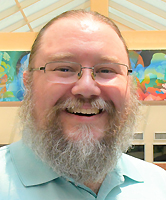 Dr. Marc Fiddler is a Senior Research Associate and Adjunct Professor at NCA&T. He received his BS in Chemistry from Penn State University and his Ph.D. in Analytical Chemistry from Purdue University. His research interests are in the development of new analytical capabilities in the atmospheric sciences and the health and climate effects of particulate matter from biomass burning. He is responsible for training community members in gathering air quality measurements, deploying low-cost sensors in the Piedmont Triad area, and investigating the nighttime chemistry of phenolic compounds in a smog chamber.
Dr. Marc Fiddler is a Senior Research Associate and Adjunct Professor at NCA&T. He received his BS in Chemistry from Penn State University and his Ph.D. in Analytical Chemistry from Purdue University. His research interests are in the development of new analytical capabilities in the atmospheric sciences and the health and climate effects of particulate matter from biomass burning. He is responsible for training community members in gathering air quality measurements, deploying low-cost sensors in the Piedmont Triad area, and investigating the nighttime chemistry of phenolic compounds in a smog chamber.
Collaborators
Chief Sustainability Officer, City of Greensboro
 Shree attended Albany State University (Albany, GA) for her undergraduate (BS, Biology – 2005) and graduate (MPA, Water Resources Management and Policy – 2007) degrees, and later earned her doctoral degree (DM, Management – Environmental and Social Sustainability – 2013) from Colorado Technical University (Colorado Springs, CO).Shree leads the continued development of the City of Greensboro Office of Sustainability and Resilience with varied programs and initiatives and is responsible for transforming the shift toward a more sustainable future for City operations and beyond. Shree has a broad professional background in the public sector encircling agricultural conservation, biological sciences, sustainability, and overall environmental analysis. Experiencing such as changing climate, she has a passion to encourage policy solutions and to educate with storytelling and active environmental stewardship. Before relocating back to NC in May 2022, Shree worked for the New York City Department of Environmental Protection and was responsible for the coordination and implementation of a Stormwater Management Program Plan for all major boroughs of NYC.
Shree attended Albany State University (Albany, GA) for her undergraduate (BS, Biology – 2005) and graduate (MPA, Water Resources Management and Policy – 2007) degrees, and later earned her doctoral degree (DM, Management – Environmental and Social Sustainability – 2013) from Colorado Technical University (Colorado Springs, CO).Shree leads the continued development of the City of Greensboro Office of Sustainability and Resilience with varied programs and initiatives and is responsible for transforming the shift toward a more sustainable future for City operations and beyond. Shree has a broad professional background in the public sector encircling agricultural conservation, biological sciences, sustainability, and overall environmental analysis. Experiencing such as changing climate, she has a passion to encourage policy solutions and to educate with storytelling and active environmental stewardship. Before relocating back to NC in May 2022, Shree worked for the New York City Department of Environmental Protection and was responsible for the coordination and implementation of a Stormwater Management Program Plan for all major boroughs of NYC.
Role with the CRC Project: Shree is working with Dr. Stone on the community outreach projects that will include surveying focus groups from Greensboro’s Community Sustainability Council (CSC), Winston-Salem’s Community Sustainability Program Committee, and stakeholders from the Charlotte area as well. Shree will also assist Dr. Fiddler with the set-up of the Citizen Science trainings as it aligns with the placement of the air quality sensors in the disadvantaged communities of Greensboro.
Pacific Northwest National Laboratory https://www.pnnl.gov/people/manish-shrivastava
 Dr. Shrivastava’s research broadly encompasses the climate and health impacts of aerosols, atmospheric chemistry, new particle formation and growth, regional and global modeling, and analyses of the interactions between human pollution and natural forested regions, the formation of secondary organic aerosols, and the influence of human activities on air quality.
Dr. Shrivastava’s research broadly encompasses the climate and health impacts of aerosols, atmospheric chemistry, new particle formation and growth, regional and global modeling, and analyses of the interactions between human pollution and natural forested regions, the formation of secondary organic aerosols, and the influence of human activities on air quality.
Relevant publications
-
Zhang, J., M. Shrivastava*, L. Ma, W. Jiang, C. Anastasio, Q. Zhang, and A. Zelenyuk (2024), Modeling Novel Aqueous Particle and Cloud Chemistry Processes of Biomass Burning Phenols and Their Potential to Form Secondary Organic Aerosols, Environmental Science & Technology, doi:10.1021/acs.est.3c07762.
-
Sharma, H., Shrivastava, M.* & Singh, B. (2023). Physics informed deep neural network embedded in a chemical transport model for the Amazon rainforest. npj Climate and Atmospheric Science 6, 28, https://doi.org/10.1038/s41612-023-00353-y
-
Zhang J., Shrivastava M.*, Zelenyuk A., Zaveri R.A., Surratt J.D., Riva M., Bell D., Glasius M. Observationally Constrained Modeling of the Reactive Uptake of Isoprene-Derived Epoxydiols under Elevated Relative Humidity and Varying Acidity of Seed Aerosol Conditions (2023). ACS Earth and Space Chemistry, 7 (4), 788-799
-
Lou, S., Shrivastava, M.*, Ding, A., Easter, R. C., Fast, J. D., Rasch, P. J., et al. (2023). Shift in peaks of PAH-associated health risks from East Asia to South Asia and Africa in the future. Earth's Future, 11, e2022EF003185.
-
Shrivastava M.B., F. Quazi Ziaur Rasool, B. Zhao, M. Octaviani, R.A. Zaveri, A. Zelenyuk-Imre, and B.J. Gaudet, et al. 2022. "Tight Coupling of Surface and In-Plant Biochemistry and Convection Governs Key Fine Particulate Components over the Amazon Rainforest." ACS Earth and Space Chemistry 6, no. 2:380-390. PNNL-SA-163479. doi:10.1021/acsearthspacechem.1c00356
Pacific Northwest National Laboratory
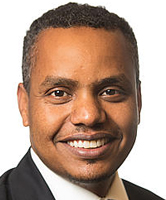 Dr. Hagos’ research interests are focused on understanding and modeling of cloud processes and land-atmosphere interactions over a wide range of spatio-temporal scales, from the life-cycles of individual convective cells, to tropical intra-seasonal oscillations, atmospheric rivers and inter-annual to multi-decadal variations of monsoon systems.
Dr. Hagos’ research interests are focused on understanding and modeling of cloud processes and land-atmosphere interactions over a wide range of spatio-temporal scales, from the life-cycles of individual convective cells, to tropical intra-seasonal oscillations, atmospheric rivers and inter-annual to multi-decadal variations of monsoon systems.
Relevant publications
- Chang C., S. Lubis, K. Balaguru, L. Leung, S.M. Hagos, and P.J. Klotzbach. 2023. "An Extratropical Pathway for the Madden-Julian Oscillation’s Influence on North Atlantic Tropical Cyclones." Journal of Climate 36, no. 24:8539 - 8559. PNNL-SA-184405. doi:10.1175/JCLI-D-23-0251.1
- Chen J., S.M. Hagos, H. Xiao, J.D. Fast, and Z. Feng. 2023. "Multiscale Analysis of Surface Heterogeneity-Induced Convection on Isentropic Coordinates." Journal of the Atmospheric Sciences 80, no. 4:983-1001. PNNL-SA-153919.
- Chen J., S.M. Hagos, H. Xiao, J.D. Fast, C. Lu, A.C. Varble, and Z. Feng, et al. 2023. "The effects of shallow cumulus cloud shape on interactions among clouds and mixing with near-cloud environments." Geophysical Research Letters 50, no. 24:Art. No. e2023GL106334. PNNL-SA-190105. doi:10.1029/2023GL106334
- Hagos S.M., Z. Feng, S. Tai, and J. Chen. 2023. "Regional variability in the environmental controls of precipitation regimes in the tropics." Journal of Geophysical Research: Atmospheres 128, no. 18:Art. No. e2023JD038927. PNNL-SA-177978. doi:10.1029/2023JD038927
- Hagos S.M., J. Chen, K.A. Barber, K. Sakaguchi, R.S. Plant, Z. Feng, and H. Xiao. 2022. "A Machine-Learning-Assisted Stochastic Cloud Population Model as a Parameterization of Cumulus Convection." Journal of Advances in Modeling Earth Systems 14, no. 7:e2021MS002808. PNNL-SA-162336. doi:10.1029/2021MS002808
Students
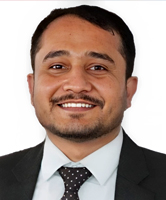
Laxmi Prasad Odari
Graduate Student, Physics

Demi Butler
Junior, Physics Major
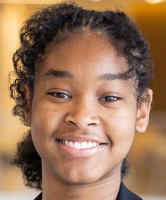
Jacquoia Hunter
Senior, Management and Marketing Major



